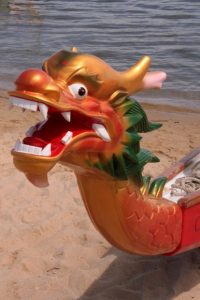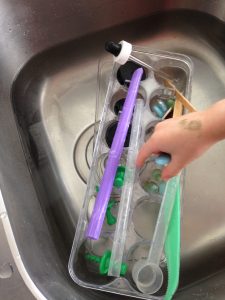 Besides reading books about dragons, how about some imaginary dragon stories? Kids can make up their own dragon adventures tales or we can do it with them.
Besides reading books about dragons, how about some imaginary dragon stories? Kids can make up their own dragon adventures tales or we can do it with them.
Stories don’t always have to come from books. With a little bit of imagination, kids can tell a story too. Made-up stories can be about anything and happen anywhere.
When driving home in the car after grocery shopping, the kids were restless. It had been a long day and they were anxious to get home. To make the drive pass a little quicker, I started by saying, “Once upon a time, there was a dragon who was very hungry. There was nothing in any of the cupboards in his cave. He was fresh out of food. He didn’t want to roast any cows or sheep or knights or princesses, that would take too long. He needed something and soon.” In my mind, I thought the most obvious solution was to get a few coins from his treasure chest and go to the grocery store. But kids’ imaginations are often quite different from adults as are their imaginary dragon stories.
 Little Sister decided she would make the dragon a magic soup and squirt it in his mouth and he wouldn’t be hungry any more. After helping to put the groceries away, while I made us something to eat, she stood at the kitchen sink and did just that. She played making the dragon some soup. The little medicine dropper was too small for a dragon so she used the turkey baster instead.
Little Sister decided she would make the dragon a magic soup and squirt it in his mouth and he wouldn’t be hungry any more. After helping to put the groceries away, while I made us something to eat, she stood at the kitchen sink and did just that. She played making the dragon some soup. The little medicine dropper was too small for a dragon so she used the turkey baster instead.
Humans are hard-wired for stories, according to Alison Gopnik. As Orion Jones writes, “Every culture bathes their children in stories to explain how the world works and to engage and educate their emotions.” (How the Human Brain Became Hardwired to Tell Stories)Think of this from a brain point-of-view. The brain doesn’t come with everything already downloaded. The brain has to learn things out for itself. This comes from experience but there’s so much to figure out and so much happening. No one person could have enough first-hand experiences and interactions. The brain needs some short-cuts.
 Stories are a tremendous way for brains to have an experience and learn from it without having to actually be there. Stories are an efficient way to link up a series of events and explain cause and effect. They are not all imaginary. For instance, think of a day as a story. First we get up, eat, and many of us get ready to go out. What happens after that? Hopefully, it ends at a decent hour and we get a good night’s rest. Our day has a beginning, a middle, and an end.
Stories are a tremendous way for brains to have an experience and learn from it without having to actually be there. Stories are an efficient way to link up a series of events and explain cause and effect. They are not all imaginary. For instance, think of a day as a story. First we get up, eat, and many of us get ready to go out. What happens after that? Hopefully, it ends at a decent hour and we get a good night’s rest. Our day has a beginning, a middle, and an end.
What other ending can you and your child think of for The Hungry Dragon? What might be your own imaginary dragon stories?
